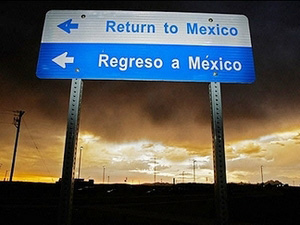 |
 |
 |
 Editorials | Opinions | July 2007 Editorials | Opinions | July 2007  
The Amnesty Defeat and Mexican Politics
 Allan Wall - PVNN Allan Wall - PVNN


| | Storm clouds swirl above a sign at the Immigration and Customs Enforcement Port of Entry along the US-Mexico border, 27 June 2007 in Columbus, New Mexico. (AFP/Chip Somodevilla) |
On June 28th, in the U.S. Senate, the Bush-Kennedy Immigration Bill, S. 1639 was defeated, by being voted down on a cloture vote.

In Mexico, where U.S. immigration legislation is followed closely, the Senate vote was almost immediately slammed by Mexican president Felipe Calderon, who called it a “grave error”.

This was followed up in Belize, where Calderon traveled to meet with Central American leaders. There, Mexico and all the Central American countries called upon the U.S. Congress to take up the measure again and, presumably, vote their way.

This kind of knee-jerk response to U.S. immigration policy has become quite the norm for some Latin American leaders for whom emigration has practically become a state economic policy.

Even Tony Garza, U.S. ambassador to Mexico and Bush crony, got into the act, releasing a diplomatic statement expressing his disappointment with the U.S. Senate.

The fact is, S. 1639 was unpopular among the American people, it was an amnesty, it did not solve the border security problem and it was negotiated behind closed doors by the political elite of both parties. Nevertheless, a grassroots outcry made itself heard in the Senate, and shut down S. 1639.

Mexican leaders should respect the decision, and use their energy to concentrate on improving the Mexican economy.

And, what a coincidence! The defeat of S. 1639 in the U.S. Senate beautifully coincides with the ongoing negotiations over Mexican fiscal reform, which is very important for the future of Mexico and its economic development.

Calderon has sent his fiscal reform proposal to Congress. And the two major opposition parties, the PRD (Party of the Democratic Revolution) and the PRI (Institutional Revolutionary Party) want to make their own proposals.

Not only are legislators getting into the act, but so are state governors. And Marcelo Ebrard, chief of the Federal District (and a possible 2012 presidential candidate) wants to put in his two centavos’ worth. The more the merrier.

Hopefully, Mexico’s leaders can hammer out a viable and enforceable fiscal reform.

Such a reform would replace Mexico’s current, inefficient tax system, with its 40% evasion rate, with a better one that is fair and equitable.

Rich Mexicans need to pay their fair share. Mexico’s richest man is Carlos Slim, who, according to one calculation, may have just passed Bill Gates to become the richest man in the world. Is it not rather embarrassing to have the richest man in the world from the same country which makes a national obsession out of emigration?

A better Mexican taxation system would take the pressure off PEMEX, the state oil monopoly, which now has to turn over most of its profits to the federal government, thus taking away funds that could be used for oil exploration, exploitation and processing. As things stand now, Mexico is importing 40% of its gasoline!

A new fiscal system could grant more authority to state and local governments. Currently, the federal government disposes of 80% of all Mexican government resources. The states spend 16%, and municipalities (whose governments affect citizens’ lives on a daily basis) only 1%.

Most importantly, Mexican fiscal reform should bring about a new system which would make the Mexican economy more dynamic, providing more jobs, and better paying jobs, to Mexicans in Mexico.

Indeed, this is what Mexican leaders should be concentrating on, and not U.S. immigration policy! That, after all, is responsibility of the U.S. government.

In fact, Mexico should use the defeat of S. 1639 as an opportunity for reform. After all, what if the U.S. finally does tighten up its border and decrease immigration levels?

Historically, the U.S. goes through both high and low levels of immigration. From the 1880s to the 1920s, the classic Ellis Island era, immigration levels were high. In the 1920s, immigration was cut off and remained low until the 1960s. That low immigration period allowed the U.S. to assimilate all those previous immigrants.

Immigration levels have been high for the past 40 years, since the 1960s. The historical precedent might indicate that another period of low immigration is in the future.

That means that Mexico should not be relying on high U.S. immigration levels to solve its economic shortcomings. Mexico needs to improve its own economy, to provide jobs for her own people. That’s much better in the long run anyway.
 Allan Wall is an American citizen who has been teaching English in Mexico since 1991, and writing articles about various aspects of Mexico and Mexican society for the past decade. Some of these articles are about Mexico's political scene, history and culture, tourism, and Mexican emigration as viewed from south of the border, which you can read on his website at AllanWall.net. Allan Wall is an American citizen who has been teaching English in Mexico since 1991, and writing articles about various aspects of Mexico and Mexican society for the past decade. Some of these articles are about Mexico's political scene, history and culture, tourism, and Mexican emigration as viewed from south of the border, which you can read on his website at AllanWall.net.

Click HERE for more articles by Allan Wall. | 
 | |
 |



